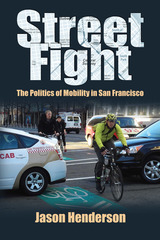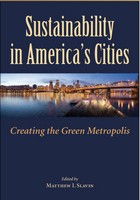2 books about Henderson, Jason

Street Fight
The Politics of Mobility in San Francisco
Jason Henderson
University of Massachusetts Press, 2013
Faced with intolerable congestion and noxious pollution, cities around the world are rethinking their reliance on automobiles. In the United States a loosely organized livability movement seeks to reduce car use by reconfiguring urban space into denser, transit-oriented, walkable forms, a development pattern also associated with smart growth and new urbanism. Through a detailed case study of San Francisco, Jason Henderson examines how this is not just a struggle over what type of transportation is best for the city, but a series of ideologically charged political fights over issues of street space, public policy, and social justice.
Historically San Francisco has hosted many activist demonstrations over its streets, from the freeway revolts of the 1960s to the first Critical Mass bicycle rides decades later. Today the city's planning and advocacy establishment is changing zoning laws to limit the number of parking spaces, encouraging new car-free housing near transit stations, and applying "transit first" policies, such as restricted bus lanes. Yet Henderson warns that the city's accomplishments should not be romanticized. Despite significant gains by livability advocates, automobiles continue to dominate the streets, and the city's financially strained bus system is slow and often unreliable.
Both optimistic and cautionary, Henderson argues that ideology must be understood as part of the struggle for sustainable cities and that three competing points of view—progressive, neoliberal, and conservative—have come to dominate the contemporary discourse about urban mobility. Consistent with its iconic role as an incubator of environmental, labor, civil rights, and peace movements, San Francisco offers a compelling example of how the debate over sustainable urban transportation may unfold both in the United States and globally.
Historically San Francisco has hosted many activist demonstrations over its streets, from the freeway revolts of the 1960s to the first Critical Mass bicycle rides decades later. Today the city's planning and advocacy establishment is changing zoning laws to limit the number of parking spaces, encouraging new car-free housing near transit stations, and applying "transit first" policies, such as restricted bus lanes. Yet Henderson warns that the city's accomplishments should not be romanticized. Despite significant gains by livability advocates, automobiles continue to dominate the streets, and the city's financially strained bus system is slow and often unreliable.
Both optimistic and cautionary, Henderson argues that ideology must be understood as part of the struggle for sustainable cities and that three competing points of view—progressive, neoliberal, and conservative—have come to dominate the contemporary discourse about urban mobility. Consistent with its iconic role as an incubator of environmental, labor, civil rights, and peace movements, San Francisco offers a compelling example of how the debate over sustainable urban transportation may unfold both in the United States and globally.
[more]

Sustainability in America's Cities
Creating the Green Metropolis
Edited by Matthew I. Slavin
Island Press, 2011
"Sustainability" is more than the latest "green" buzzword. It represents a new way of viewing the interactions of human society and the natural world. Sustainability in America's Cities highlights how America's largest cities are acting to develop sustainable solutions to conflicts between development and environment.
As sustainability rises to the top of public policy agendas in American cities, it is also emerging as a new discipline in colleges and universities. Specifically designed for these educational programs, this is the first book to provide empirically based, multi-disciplinary case studies of sustainability policy, planning, and practice in action. It is also valuable for everyone who designs and implements sustainability initiatives, including policy makers, public sector and non-profit practitioners, and consultants.
Sustainability in America's Cities brings together academic and practicing professionals to offer firsthand insight into innovative strategies that cities have adopted in renewable energy and energy efficiency, climate change, green building, clean-tech and green jobs, transportation and infrastructure, urban forestry and sustainable food production. Case studies examine sustainability initiatives in a wide range of American cities, including San Francisco, Honolulu, Philadelphia, Phoenix, Milwaukee, New York City, Portland, Oregon and Washington D.C. The concluding chapter ties together the empirical evidence and recounts lessons learned for sustainability planning and policy.
As sustainability rises to the top of public policy agendas in American cities, it is also emerging as a new discipline in colleges and universities. Specifically designed for these educational programs, this is the first book to provide empirically based, multi-disciplinary case studies of sustainability policy, planning, and practice in action. It is also valuable for everyone who designs and implements sustainability initiatives, including policy makers, public sector and non-profit practitioners, and consultants.
Sustainability in America's Cities brings together academic and practicing professionals to offer firsthand insight into innovative strategies that cities have adopted in renewable energy and energy efficiency, climate change, green building, clean-tech and green jobs, transportation and infrastructure, urban forestry and sustainable food production. Case studies examine sustainability initiatives in a wide range of American cities, including San Francisco, Honolulu, Philadelphia, Phoenix, Milwaukee, New York City, Portland, Oregon and Washington D.C. The concluding chapter ties together the empirical evidence and recounts lessons learned for sustainability planning and policy.
[more]
READERS
Browse our collection.
PUBLISHERS
See BiblioVault's publisher services.
STUDENT SERVICES
Files for college accessibility offices.
UChicago Accessibility Resources
home | accessibility | search | about | contact us
BiblioVault ® 2001 - 2024
The University of Chicago Press









